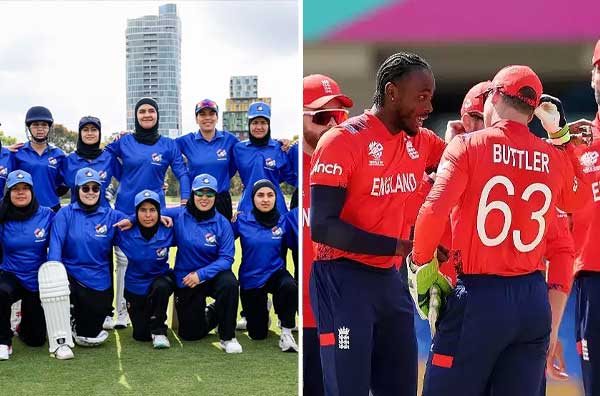In a powerful display of solidarity, England’s men’s cricket team has stepped forward to support Afghanistan’s exiled women cricketers, offering financial aid where global cricket authorities have failed. The team has donated £20,000 to the Marylebone Cricket Club’s (MCC) Global Refugee Cricket Fund, which aims to raise £1 million to assist displaced players worldwide.

Afghanistan’s leading female cricketers were forced to flee in 2021, after the Taliban’s return to power led to a complete ban on women’s sports. However, despite ICC regulations requiring full-member nations to support both men’s and women’s cricket, Afghanistan’s men’s team continues to compete internationally without consequences—a contradiction that has drawn widespread criticism.
England’s Champions Trophy fixture against Afghanistan was at the center of a heated political debate. Over 160 British politicians urged England to boycott the match, arguing that playing would mean tacitly endorsing the Taliban’s gender apartheid.
However, rather than withdrawing, the England and Wales Cricket Board (ECB) took a different route—lobbying behind the scenes for an international response. Now, England’s players have taken matters into their own hands, using their own resources to support the exiled Afghan women cricketers who have been ignored by the ICC for years.
Daryl Mitchell, chair of the Professional Cricketers’ Association and a Team England Player Partnership (TEPP) board member, highlighted the England squad’s desire to act after learning about the refugee fund:
“Having spent time in Pakistan with the England team during the Champions Trophy, it was apparent that the wider squad wanted to offer their support…”
He went on to commend the MCC for its efforts, “The MCC and MCC Foundation should be applauded for the creation of the initiative…..I am sure the donation from the players will support its goal to use cricket to bring a smile to the faces of those who have been displaced across the world.”
Despite repeated appeals, the International Cricket Council (ICC) has yet to take decisive action to support Afghanistan’s exiled women cricketers.
In July 2024, 17 former Afghan players, who were contracted by the Afghanistan Cricket Board (ACB) in 2020, officially requested the ICC’s help in forming a refugee team in Australia. The governing body has yet to issue a formal response.
The situation is further complicated by logistical challenges. Some of these players now live in the UK and Canada, making it nearly impossible to form a team without proper funding and infrastructure.
Richard Gould, CEO of the ECB, explained why England chose to play against Afghanistan rather than boycott the match, “I think if you end up boycotting a game, the Taliban won’t care. Half the Taliban don’t want cricket at all being played in Afghanistan, so that doesn’t help the Afghani people, and that’s where our priorities are.”
Gould made it clear that England wanted to be part of the solution rather than disengage, “It’s not something that we want to be associated with, or anybody does, in terms of taking the sport forward.”
Finally, he pointed out that the ICC must step up, “We need to make sure that the ICC takes action, because we need to make sure that as a sport, as a global sport, that we are sending the appropriate messages.”
Despite the ICC’s inaction, Afghanistan’s exiled women cricketers recently played their first match in exile, competing against Cricket Without Borders (CWOB) under the name Afghanistan Women’s XI in Melbourne, Australia.
However, due to restrictions imposed by both the Afghanistan Cricket Board (ACB) and ICC, they were not allowed to use the official Afghanistan Women’s team designation or wear the national jersey.
While symbolic, the match showcased the resilience of these players, who continue to fight for their right to represent their country.
While the ICC remains inactive, some cricketing nations have started taking their own form of protest. Both the ECB and Cricket Australia have refused to schedule bilateral series against Afghanistan’s men’s team—sending a subtle but strong message that gender discrimination cannot be ignored.
However, without official ICC sanctions, Afghanistan continues to participate in global tournaments, while its female cricketers remain exiled, unrecognized, and unsupported.
The ICC’s handling of Afghanistan’s membership remains a glaring inconsistency. While its own rules state that full-member nations must support both men’s and women’s cricket, the ICC argues that its hands are tied due to its member-led voting structure.
If a majority of ICC board members refuse to recognize an exiled Afghanistan women’s team, the governing body can claim that it lacks the authority to intervene—a loophole that has allowed Afghanistan’s men’s team to continue competing without fulfilling the basic requirements of full membership.
Though £20,000 is only a fraction of what’s needed to sustain a full-fledged refugee cricket team, England’s gesture is a powerful statement. It signals that players are willing to take action where cricket’s governing bodies have failed.
The Global Refugee Cricket Fund is still far from reaching its £1 million target, but England’s donation has set a precedent. The real question now is—will other cricketing nations step up, or will the ICC continue to turn a blind eye?
(Quotes sourced from Sky Sports)

Loves all things female cricket